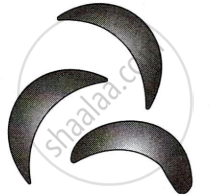Advertisements
Advertisements
Question
Conditions of a karyotype 2n ± 1 and 2n ± 2 are called ______.
Options
Aneuploidy
Polyploidy
Allopolyploidy
Monosomy
Solution
Conditions of a karyotype 2n ± 1 and 2n ± 2 are called aneuploidy.
APPEARS IN
RELATED QUESTIONS
If only one 'X' chromosome is found in a female person, which of the following symptoms she will show?
- epicanthal skin fold
- webbing of neck
- small testis and absence of spermatogenesis
- presence of simian crease on the palm
Why are color-blindness and thalassaemia categorised as Mendelian disorders? Write the symptoms of these diseases seen in people suffering from them.
A colour-blind child is born to a normal couple. Work out a cross to show how it is possible. Mention the sex of this child.
Give the importance of heterocyst in cyanobateria.
If a genetic disease is transferred from a phenotypically normal but carrier female to only some of the male progeny, the disease is ______.
In sickle cell anaemia glutamic acid is replaced by valine. Which one of the following triplets codes for valine?
It is well known that Queen Victoria of England was a carrier for haemophilia. Since this is an X-linked disease, it can be predicted that ______.
Extra chromosome ‘X’ is present in which one of the following cases?
Read the following and answer from given below:
Turner's syndrome is an example of monosomy. It is formed by the union of an allosome-free egg and a normal 'X' containing sperm or a normal egg and an allosome-free sperm. The individual has 2n = 45 chromosomes (44 + X0) instead of 46. Such individuals are sterile females who have rudimentary ovaries, underdeveloped breasts, small uterus, short stature, webbed neck, and abnormal intelligence. They may not menstruate or ovulate. This disorder can be treated by giving female sex hormones to women from the age of puberty to make them develop breasts and have menstruation. This makes them feel more normal.
Turner's syndrome is a/an ______
Jacob is genetically a carrier of the disorder that affects the shape of the RBCs, as shown in the diagram below. His son James suffers from the same disorder.

- Give the biochemical reason for the disorder that changes the shape of the RBCs, as shown above.
- Draw a Punnett square to show the genotype of the mother of James.
- Name and define the type of 'point mutation' responsible for this disorder.
